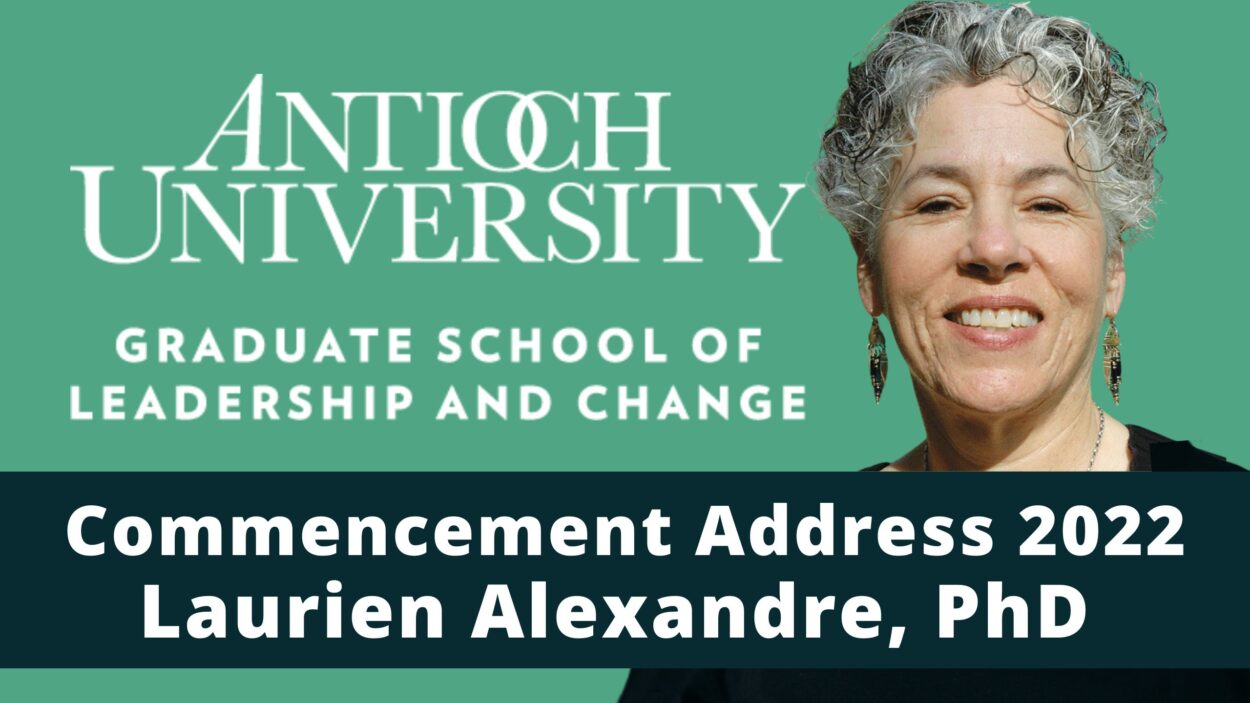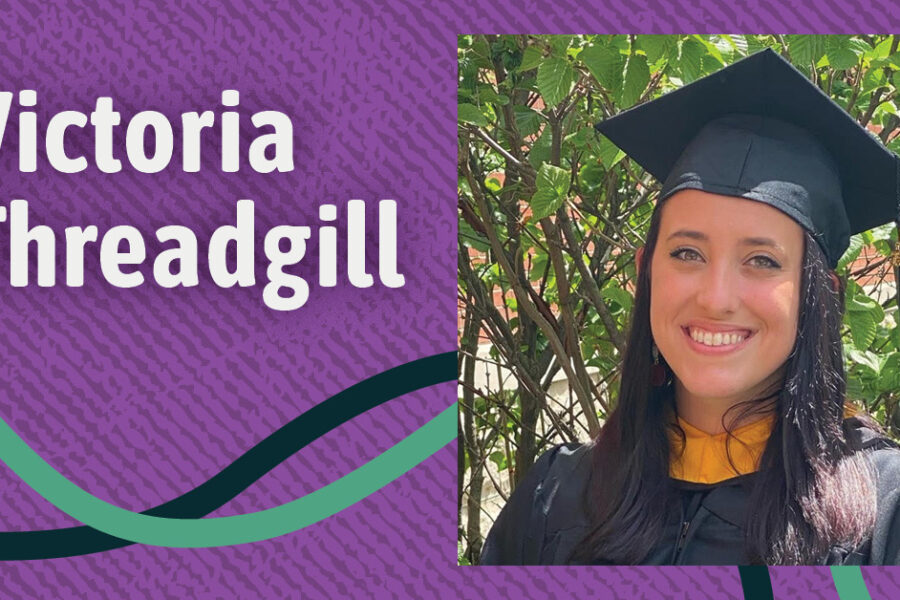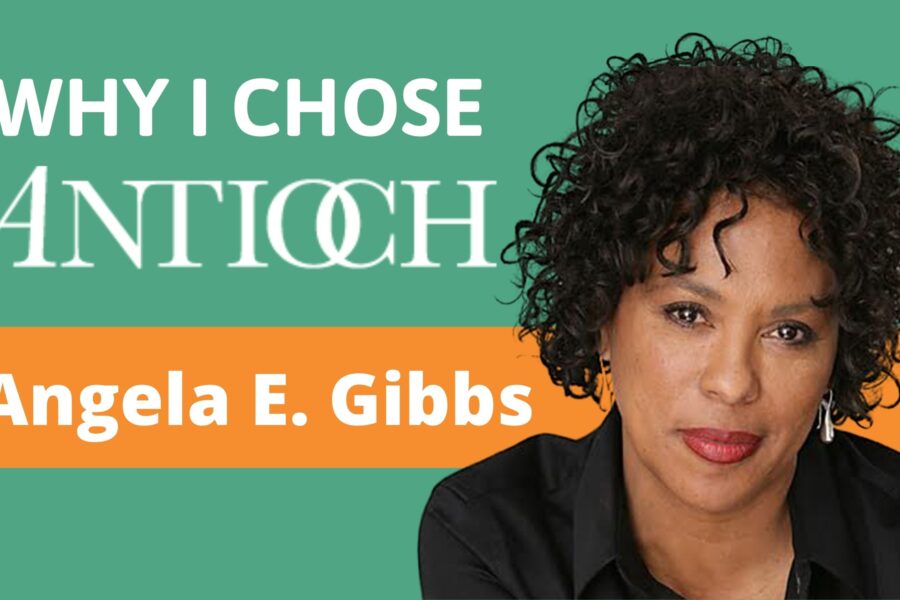I’ve reflected a lot these past months about what to say to you today, in these few short minutes we have to shine light on your amazing achievement while also recognizing the dark times in which we are holding this celebration.
I admit, I’ve been finding it hard to find the right words, and you know, words matter to me.
In one of my recent commencement addresses, I called upon you, graduates of Antioch’s PhD in Leadership & Change, to read as if our country depended on it.
It does.
Last year, I encouraged you to find hope, radical hope, as if our lives depended upon it.
They do.
Today, I want to call upon you to dissent.
To engage in principled insubordination against injustice.
To raise voices against voter suppression.
To challenge conspiracy mongers and act audaciously against authoritarianism.
Our democracy demands it.
Let’s be clear.
To dissent is a personal choice,
to speak up, a professional choice,
to protest, a political choice.
Those who know me know that dissent comes naturally. I was thrown out of high school for refusing to abide by a dress code. Then, I was thrown out of school for refusing to cross the teachers’ picket line. And then, I was thrown out of school for opposing an unjust war.
Maybe that’s why Antioch has been my home for the past 32 years. A place for the purposefully disobedient.
When Horace Mann called upon Antioch graduates to ‘win those victories for humanity’ he was saying – just as he lived – you cannot be silent in the face of racism and bigotry, nor complicit with fundamental attacks on women’s rights. He took a stand. Antioch College was founded on those principles.
While we have never truly been an inclusive country, today it feels like we are a more broken nation, certainly more than any time in my lifetime. Perhaps not since the 1860s, when Horace stood up. As Antiochians, if we wanted to win those victories then we cannot sit on the sidelines now.
A flood of books and commentators have detailed how democracies die offering up dire assessments of just how fragile a state we are in, and the dangerous misogyny, racism, and authoritarianism in our midst.
Watching the recent January 6th Committee hearings these past weeks brought me little comfort given how close we came and how sinister the scheme. I fear it isn’t over.
Even if one malicious narcissist were to magically disappear there are millions who believe the trumped-up lies. It is not just the extremist alt-right and White nationalists who have jumped onboard, but partisan politicians who care more about their party’s power and personal ambition than the country, and then there are millions who blame ‘the other’ for their discontent.
I’ve been thinking a lot these days about the famous quote attributed to Voltaire, “Anyone who can make you believe absurdities can make you commit atrocities.”
That so many could believe such absurdities is frightening.
That so many could be swayed tells me our educational systems have failed democracy miserably. By that, I mean that our American populace is not sufficiently educated in the rules of democracy nor the responsibilities of an informed citizenry, nor the critical thinking skills to discern fact from fiction.
I don’t lay it all on education, of course.
Clearly, our country has failed far too many and as economic inequalities increase, winners plunder while losers look for scapegoats. History has shown us that when people are angry, underpaid or undervalued, and isolated, they will fill the void with something to believe in, they will accept the most outlandish ideas and follow leaders blindly.
So, what is the responsibility of universities in a time like this and where does dissent fit in?
Did you know that when land grant public universities were created in the mid-1860s they were referred to as “democracy’s colleges”? Why? Because a thriving democracy needs an educated populace. Such efforts were all the more necessary to bring a war-ravaged nation together to build a shared country.
It should not go unmentioned that the very lands upon which these public universities were established had been stolen from indigenous tribes, demonstrating once again the very complicated complicity of our democracy with our country’s founding evils.
That said, for purposes of my brief talk today, at the core of these public colleges was the fundamental belief that education was a public good. It IS a public good. Higher education’s raison d’etre is not just about credentials for careers, rather, as I’m prone to say, it is about jobs AND justice.
Serving the common good, educating the population to be informed and discerning, should be our core purpose and frame what we teach, how we teach, the ways we engage with our communities and so on.
And, part of that service to the common good is teaching about the power and purpose of dissent in our democracy.
I like to think of educational institutions as one of democracy’s sites of conscience. Which makes today’s attacks all the more sinister. Trying to silence teachers, ban books, criminalize critical theory, whitewash history, and stifle student protest are efforts that every authoritarian has used to quell dissent over decades and centuries.
What gives me some comfort is knowing – in the final analysis – those tactics will not work. They never do.
That said, I think many of the recent books on what universities should be doing to strengthen democracy in these dark times are too timid.
Yes, we must engage in civic education.
It is appalling that only 1 in 4 Americans were able to name the three branches of government in a 2016 survey or that 80% of college seniors at top-ranked schools would earn a D or F on historical knowledge of this country in a 2019 Pew study.
Our oft-quoted Horace Mann argued that free universal schooling was essential to the American experiment of self-governance and noted “woe to the republic that rests upon no better foundations than ignorance, selfishness, and passion.”
So, yes, we need civic education. That’s what we’d call “to educate for democracy.”
And, we of course should do everything possible to ensure that students, faculty and staff vote and do so in record numbers in the coming elections.
We should also make education free, a human right along with healthcare, and eliminate student debt, an important step to democratizing education for all, not just those who can afford it.
I could go on ….
But for now, what I want to say is that teaching citizenship, to be law-abiding, tolerant, and to vote, is not enough!
We need to teach dissent.
Dissent is a principled opinion in opposition to a policy or practice enforced by the prevailing authority, such as a government. It requires a healthy skepticism towards authority and a willingness to scrutinize systems of power. Dissent is an attitude of mind as much as it is an action.
So, when I say we need to teach dissent, at the macrolevel, we need to teach about the three branches of government, and how they are supposed to work, the checks and balances.
But do we teach what happens when each branch is corrupted, involved in undemocratic actions and decisions?
We must dissent.
We need to teach about the rule of law but what happens when those who live in golden towers or within blue lines think they are above that law?
We must dissent.
We need to teach about the rights of all but what happens when an illegitimate packed Court takes those rights away?
We must dissent.
We need to teach the country’s history, including the stories of rebels and whistleblowers, the power of sit-ins and walk-outs, the dissenting legal opinions that have furthered rights for all.
We should teach about those who stood up to unethical and immoral behavior, who wrote books, rode buses and marched across bridges. These powerful acts of dissent may appear in a decisive moment, as an individual act, but those ideas are nurtured in communities and movements often years in the making and those dissenters are educated to win victories, not for themselves, but for humanity.
So, what does dissent have to do with a leadership program?
I know – it’s pretty ironic to have the words “leadership” and “dissent” in the same sentence.
But, that’s me.
At the individual level, I’d say first, we need to teach the practice of “auto-dissent.” I just made that term up. It means the ability to question authority, one’s own.
Holding any sort of positional authority can easily encourage a belief that one’s views are right – and that should never go unopposed. Authoritarian tendencies can live inside all of us. You know the saying, ‘power goes to our heads’ and neuroscientists have even found evidence to suggest feeling powerful dampens a part of our brain that helps with empathy.
So, we need to train individuals that there are checks and balances on themselves – let’s call it self-regulatory dissent – just as we need those checks and balances in democracy writ large. That’s the value of reflective practice personally and professionally.
And then, what’s the role of dissent as practitioners, as leaders?
A singular individual with unchecked organizational authority can wreck havoc on a company just as on a country. Unfortunately, organizational leaders often choose to ignore expressions of disagreement, discourage any dissent, and retaliate against those who raise opposition.
Instead, I suggest to those of us who have the privilege to lead organizations that we should see dissent as a warning sign of employee dissatisfaction and even organizational decline.
We need to teach our learners – our leaders – to listen to dissent. Instead, leadership preparation is often solely focused on things like decision-making skills and strategic planning. But, keep in mind. The quality of decision-making improves when our minds are open to dissenting viewpoints. Real leadership is not a solo act and part of preparing leaders for thriving workplaces and organizations is helping them to listen to dissent.
And then, we need to ask, what is the role of dissent as leadership scholars?
Of course, many a scholarly tradition from law to philosophy, political science to religion, the arts and humanities, argue for the right of dissent. They take outsider views and question authority, be those the dominant views in their fields or the prevailing authority of the state.
That’s why writers, scholars, artists, and poets are often the first to speak truth to power and often the first to be silenced, ostracized and imprisoned.
So, I’d say as leadership scholars, let’s be paradigm shifting. What could be more at the core of an Antioch leadership program than to confront the field’s canons, to challenge systems of implicit authority, and to question theories of embedded power.
Let’s redesign change strategies that strategically marginalize and silence to ones that level the playing field.
Let’s base our research not only on informed consent but on informed dissent.
With the little time I have left today, there is one more angle I’d like to raise.
The role of dissent in a learning community, in this case, a leadership learning community.
I would like to envision our program as a hub for dissenting voices, a venue for the nurturing of unconventional ideas.
In The Quiet Before: On the Unexpected Origins of Radical Ideas, Gal Beckerman fascinatingly traces the origins of democracy’s most radical ideas from discussions and discourse, through writing and reading, and sharing forms of thought and communications.
He tracks the incubation of democratic ideas from the early philosophers’ Republic of Letters to the creation of early manifestos, whether feminist or abolitionist, to the hand-passed hand-written underground journals of dissent in the Soviet Union, to the blogs that led thousands to the Arab Spring.
If his argument holds merit, which to me it does, then we need to find places and ways to communicate and nurture dissenting ideas that will build democratic movements, workplaces and communities as well as democratic individuals, leaders and citizens who understand their responsibility to dissent.
I’d love to imagine this Graduate School as a site for all sorts of impassioned conversations among dreamers of progressive change and dissenters from the status quo. Philosophers like Hannah Arendt talked of the need for a common table,
and education theorists like John Dewey referenced the importance of small public spaces,
and Beckerman talks about localized platforms for connecting in this digital age.
What is clear is we need intimate places where we can meet to connect small communities to engage in purposeful conversation that challenge the dominant views.
How can we make the PhD program such a space? In The Art of Insubordination, the author lays out a cookbook to create rebel-friendly cultures.
As you might guess, I love that!
Not the cooking part but the culture part.
The steps include building cultures that affirm critical thinking, freedom of thought, respect for difference;
That fight against confirmation bias, as hard as that is for leaders to do;
and
that value dissent and embrace intellectual humility.
I was once told our program was designed by baby boomers for baby boomers and that times change, I agree; let’s reimagine that. Our program was designed by dissenters – scholars and practitioners who defied the academic status quo – for those who want to think, study and practice purposeful and principled dissent.
That’s timeless.
It should not go unnoticed that in Horace Mann’s words to the first Antioch graduating class he declared how important it was to “triumph over some abuse of church or state, some vice or folly in society, some false opinion.”
Let that sink in. Mann is telling each graduate to act, to question the authority of church or state. He is telling us to speak out against lies and liars. Those promoting false opinion. To be bold in our defense of facts and truth.
In conclusion, I believe that every Antioch graduate – as an individual, a practitioner, a scholar — needs to find their cause and their purpose, which triumph over which abuse, which false opinion you want to call out and in what way.
It would be inappropriate for me to tell you what is your cause or how to voice your concern.
But, I do ask you – in the name of Antioch and the legacy of Horace Mann – to speak out against false opinions and to act against injustice. To disobey when an order is unjust. To dissent when a decision is unfair. To use your voice to triumph over abuse and folly. To challenge the Big Lie and big liars. To vote as if our lives depend upon on it. They do.
A fictionalized character in a novel I recently read, a poet, captured the sentiment I would like to conclude with today, when the poet asks, “What kind of an idea are you? Are you the kind that compromises, does deals, accommodates itself to society, aims to find a niche to survive; or are you the cussed, bloody-minded, ramrod-backed type of damn fool notion that would rather break than sway with the breeze? The kind that will almost certainly, ninety-ninety times of hundred, be smashed to bits, but, the hundredth time, will change the world.”
Be that 100th voice!





